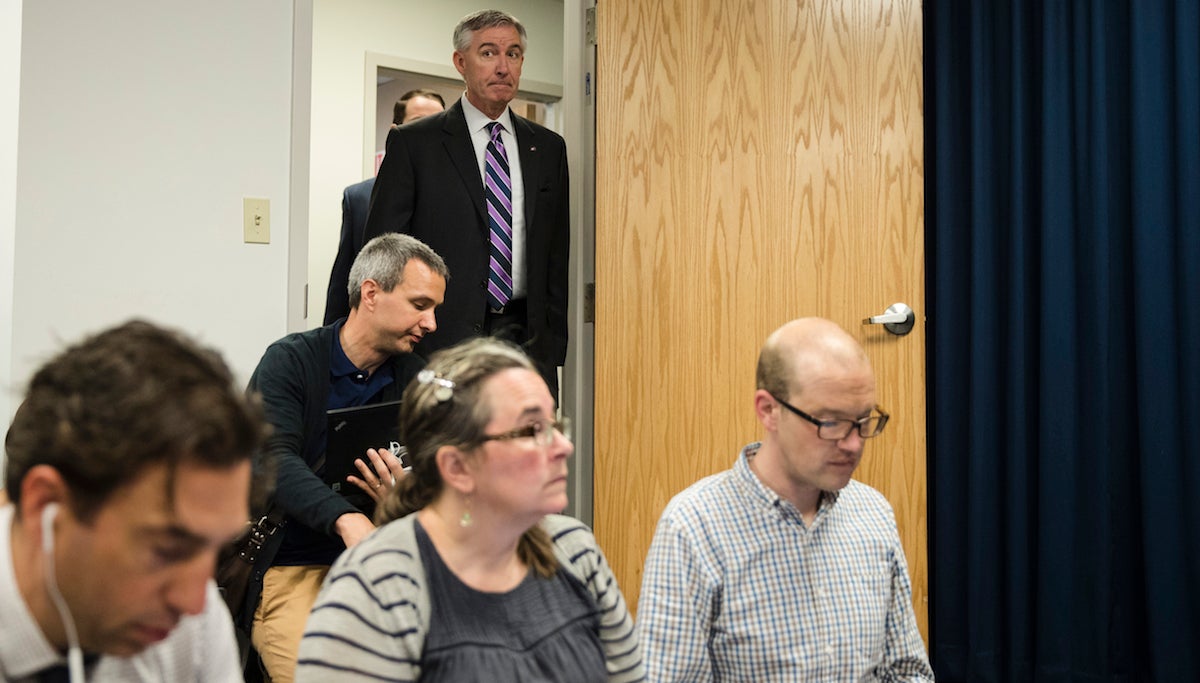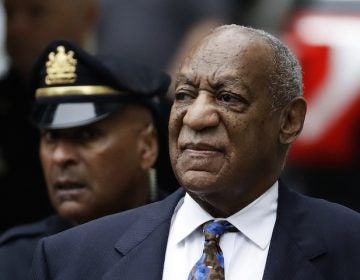Prosecutor moves to block release of Cosby jurors’ names, citing ‘chilling effect’ on new jury

District Attorney Kevin Steele walks to the podium for a news conference after a mistrial in Bill Cosby's sexual assault case in Norristown, Pa., Saturday. (AP Photo/Matt Rourke)
Prosecutors in Bill Cosby’s sex assault case have asked the judge not to release the names of the men and women who served on the jury.
In a motion filed Monday, Montgomery County District Attorney Kevin Steele said, “This publicity onslaught may have a chilling effect on future jurors in this remarkably high-profile case.”
In early June, media organizations — including Philadelphia Media Network and WHYY — filed a motion to gain access to the names of the discharged jurors, citing First Amendment rights to this information. Eight additional media organizations were expected to sign a motion in support of releasing the names Monday.
The jury deadlocked at the end of the two-week trial, resulting in a mistrial Saturday. Steele vowed to retry the case in the coming months.
Prosecutors and the defense initially opposed releasing the names during the trial, but not after the trial was over.
In new court documents, the prosecution asserted the court should withhold juror names to keep from compromising “an important right that will be prejudiced by publicity,” such as the defendant’s right to a fair trial. If jurors wish to come forward and talk to the press, that is within their rights, but the Commonwealth asked Judge Steven O’Neill to keep the press from descending upon the discharged jurors.
Eli Segal, attorney for the media companies seeking names, filed a response, saying the prosecutor’s request dampens the rights of the free press.
For example, prosecutors said they fear jurors could be criticized for failing to reach a verdict
“Criticism is a possibility in every case,” wrote Segal. “If this were a sufficient reason for denying the First Amendment right of access to jury names, the right would be meaningless.”
It’s not unusual for a judge to seal juror names after a trial, according to veteran defense attorney Thomas Bergstrom. In the case of a mistrial, he said attorneys are likely interested in many of the same questions as journalists.
“What were you split, how were you split, and what was the reason and what reason were you not able to resolve?” he listed as possible questions.
Cosby is still charged with three counts of aggravated indecent assault. Andrea Constand of Toronto has claimed that, during a visit to his home in 2004, Cosby gave her pills which incapacitated her. She said he then led her to a couch and molested her as she drifted in and out of consciousness.
The jury deadlocked on the sixth day of deliberations, after rehearing key testimony and asking more than a dozen questions of the court, including the definition of “reasonable doubt.”
Lead defense attorney Brian McMonagle repeatedly claimed that Constand and Cosby were in a romantic relationship, and that their assignation was consensual.
Giving someone pills to incapacitate her is “not romantic. It’s criminal,” countered Steele.
O’Neill, who declared a mistrial, is expected to set a new court date within four months. A hearing on whether to release juror’s names will be held at 3 p.m. Tuesday in Norristown.
The court sequestered the jury, drawn from Allegheny County, and many jurors were obscured from the view of many in the courtroom by a large smartboard used for displaying evidence. It is not clear how the jury split on whether to convict or acquit the 79-year-old comedian.
On Saturday, jurors climbed into into a nondescript, white tour bus and returned to Allegheny County. A police escort ensured a speedy trip and kept media at arm’s length.
One alternate juror, Mike McCloskey, 43, posted a picture of his jury badge on social media and spoke briefly with WDVE-FM in Pittsburgh. McCloskey said he would have voted to convict Cosby.
WHYY is your source for fact-based, in-depth journalism and information. As a nonprofit organization, we rely on financial support from readers like you. Please give today.




